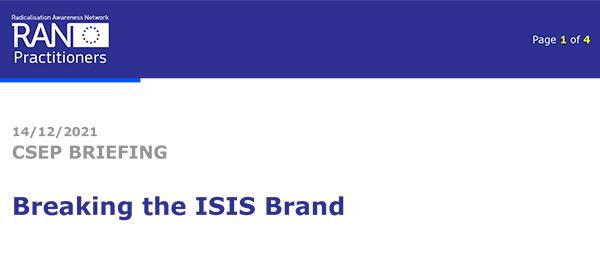
The International Center for the Study of Violent Extremism (ICSVE) has created over 250 counter narrative video clips (up to five minutes long). It has also given voice to over 50 of those who left from Europe to join ISIS. Drawing on their own lived experiences inside ISIS, they speak out against the group as un-Islamic, brutal and corrupt. Using these counter narrative videos, ICSVE has conducted over 140 targeted and general campaigns on Facebook globally, with measurable results in terms of reach and impact. It has also developed empirical methods to re-target and re-engage individuals exhibiting violent extremist tendencies online.
ICSVE research has also led to over 500 social media accounts either being removed or investigated for terrorism-related content. ICSVE Internet campaigns for this project utilised ICSVE’s counter narrative videos. Campaigns also included new videos made from interviews referred to by consortium partners and filmed in Syria and Iraq. The videos were aimed to reach target groups within the EU Member States with the highest numbers of those traveling to ISIS (Austria, Germany, Belgium, France, Finland, Greece, Italy, The Netherlands and Sweden). These are countries whose subpopulations are susceptible and vulnerable to online radicalising and terrorist content, or who are among those who already have been either been radicalised or are on the brink of radicalisation. Seventeen language groups are of particular significance for reaching these audiences, as they represent the languages of countries with a high proportion of travellers to Syria and Iraq to join groups like ISIS, and of minorities that have immigrated and have had representatives of their communities join and act on behalf of ISIS.
Furthermore, ICSVE completed the following tasks.
- Conducted and shared analysis (without identifiers being included) with interested consortium partners to help intervene for better informed face-to-face interactions with similar populations. Profiles of concern were also reported.
- Supported and trained law enforcement and CVE professionals in online interventions, face-to-face prevention, and the use of ICSVE counter narratives.
- Provided practitioners the results of current research on terrorism and empirical tools for prevention and interventions to be used in their line of work.
- Used offline focus testing of the videos with vulnerable populations where appropriate, to maximise the online campaign’s reach.
The expected impact of the proposed activities were two-fold. Firstly, behavioural changes (reversing the appeal of violent extremism as an answer to social, political, and personal problems). Secondly, boosting resilience and critical thinking and increasing confidence that one can succeed even with the challenges of being Muslim of immigrant descent, a convert to Islam and/or a migrant.
This paper follows a briefing structure, in which it summarises the campaign, the main achievements of the project, the lessons learned on online campaigning in preventing and countering violent extremism (P/CVE), and also includes links to some of the campaign messages.
Sources
Details
- Publication date
- 14 December 2021
- Author
- Directorate-General for Migration and Home Affairs
